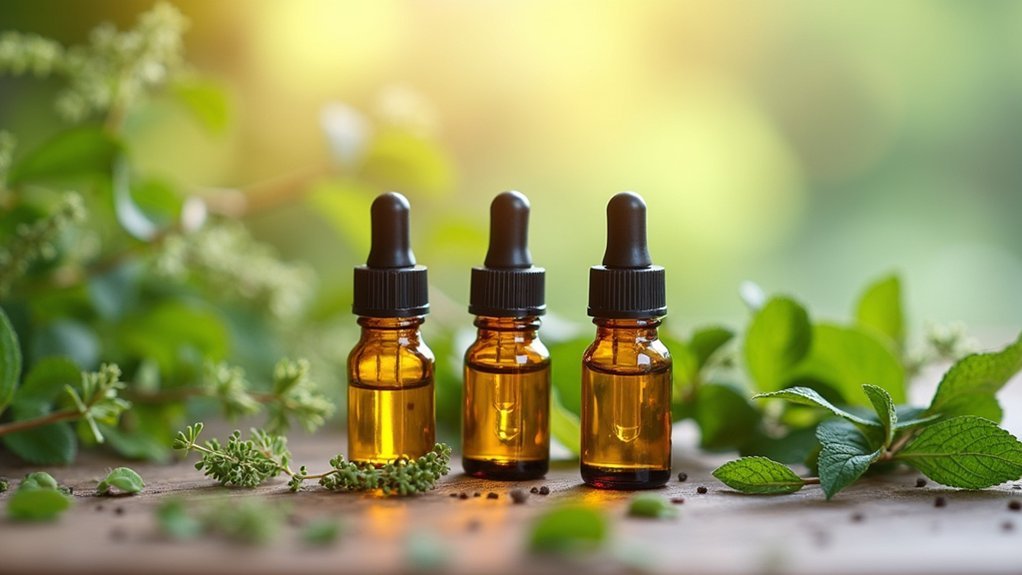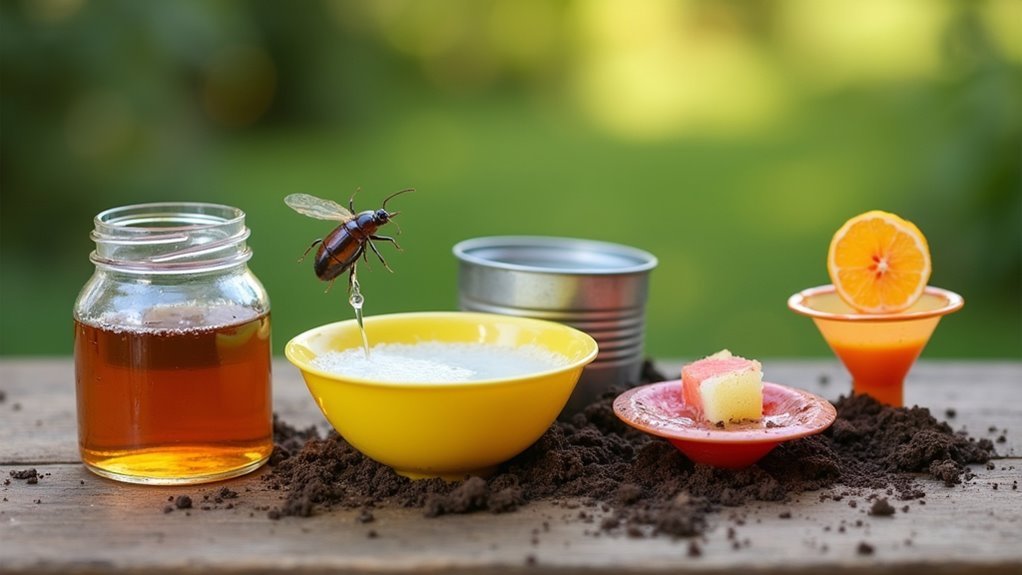Peppermint, cinnamon, and clove oils effectively repel ants from your home naturally. Peppermint disrupts their navigation by masking pheromone trails, cinnamon contains trans-cinnamaldehyde that acts as a natural pesticide, and clove oil’s eugenol works as a neurotoxic agent against ants. You can apply these oils directly to ant trails, entry points, and create barriers in cracks. These non-toxic alternatives offer pleasant aromas while keeping your home ant-free without harsh chemicals.
Peppermint Oil: The Powerful Scent That Deters Ant Colonies
Five key properties make peppermint oil one of nature’s most effective ant repellents.
First, it powerfully disrupts navigation by masking pheromone trails ants rely on to locate food sources.
Peppermint oil works its magic by erasing ants’ invisible roadmaps, leaving them directionless and unable to find food.
Second, the menthol component doesn’t just repel ants—it can kill them on contact when used in stronger concentrations.
To create your own spray, simply mix peppermint oil with water and a drop of dish soap.
Apply this solution along ant trails to prevent future ant activity. For lasting protection against ant colonies, reapply weekly at a 1% concentration minimum.
Unlike harsh chemical pesticides, this essential oil offers a non-toxic alternative that’s safe around children and pets.
You’ll enjoy the fresh scent while effectively deterring unwanted ant invasions in your home.
Cinnamon Oil: Nature’s Potent Barrier Against Ant Invasions
Homeowners searching for natural ant solutions need seek no additional options than cinnamon oil. This powerful essential oil contains trans-cinnamaldehyde that effectively disrupts ant navigation systems.
When you apply it directly to ant trails, it acts as a natural pesticide, causing ants to choke and die while its strong scent masks their pheromone pathways.
To maximize cinnamon oil’s ability to repel ants:
- Apply concentrated oil at entry points where ants commonly invade
- Create a complete barrier by treating windowsills, door frames, and cracks
- Schedule regular reapplication as the oil’s potency diminishes over time
You’ll find ants avoiding treated areas entirely, making cinnamon oil one of the most effective natural deterrents in your pest control arsenal.
Clove Oil: The Neurotoxic Shield That Protects Your Home
While cinnamon oil excels at disrupting ant navigation, clove oil takes a more direct approach to ant control. Its active compound, eugenol, functions as a natural insecticide with neurotoxic effects that immobilize ants upon contact, eventually leading to their demise.
Eugenol in clove oil acts as nature’s own ant assassin, paralyzing intruders on contact.
You’ll appreciate clove oil’s dual benefits: it effectively repels ants while filling your home with a warm, spicy pleasant aroma. As a non-toxic alternative to chemical pesticides, it’s safe around children and pets when used properly.
For maximum effectiveness in pest control, try combining clove oil with other essential oils. Regular application in ant-prone areas creates a protective shield, preventing infestations before they start.
Simply apply this powerful solution to entry points, baseboards, and countertops to maintain an ant-free environment while enjoying its aromatic qualities.
Frequently Asked Questions
Which Essential Oil Do Ants Hate Most?
Ants hate peppermint oil most intensely. You’ll find it disrupts their navigation completely. It’s particularly effective since they can’t follow their pheromone trails when exposed to its strong menthol scent.
What Smell Do Ants Hate the Most?
Ants hate peppermint smell the most. You’ll find it disrupts their navigation and communication paths completely. They’ll also avoid citrus, cinnamon, clove, and eucalyptus scents when you use them strategically around your home.
Is Cinnamon or Peppermint Better for Ants?
Cinnamon is better for killing ants as it’s lethal on contact, while peppermint excels at repelling them. You’ll find cinnamon more effective for elimination, but you’ll need to reapply peppermint weekly for prevention.
What Does Peppermint Oil Do to Ants?
Peppermint oil disrupts ants’ scent trails, confusing their navigation. You’ll find it kills ants on contact and irritates them with its menthol compound. For effectiveness, you’ll need to reapply it regularly at proper concentrations.
In Summary
You’ve discovered three natural powerhouses against ant invasions. Peppermint, cinnamon, and clove oils aren’t just pleasant scents—they’re your chemical-free defense system. Simply apply these oils to entry points and ant trails in your home. You’ll disrupt their chemical communication while keeping your family safe from harsh pesticides. It’s an effective, eco-friendly solution that’s always within reach when ants come marching in.





Leave a Reply